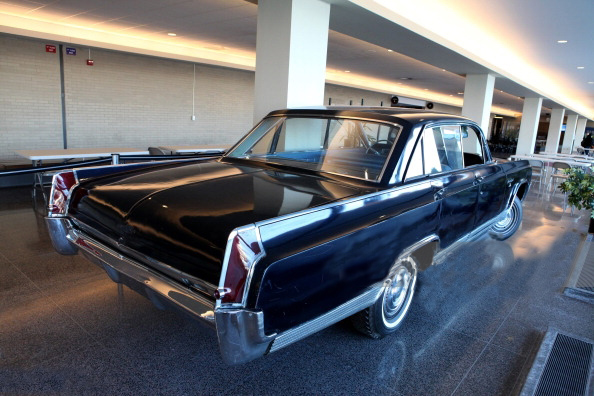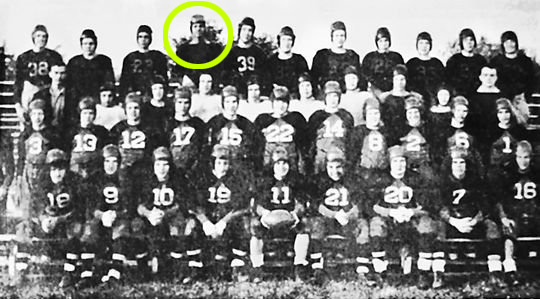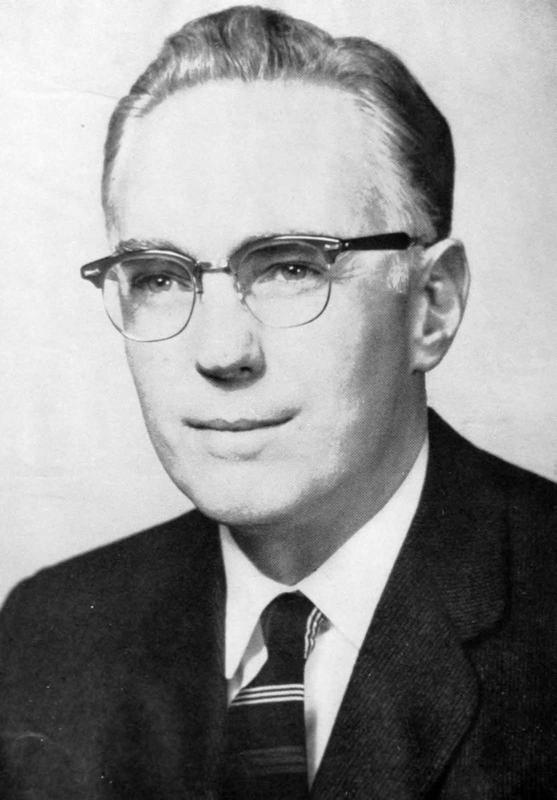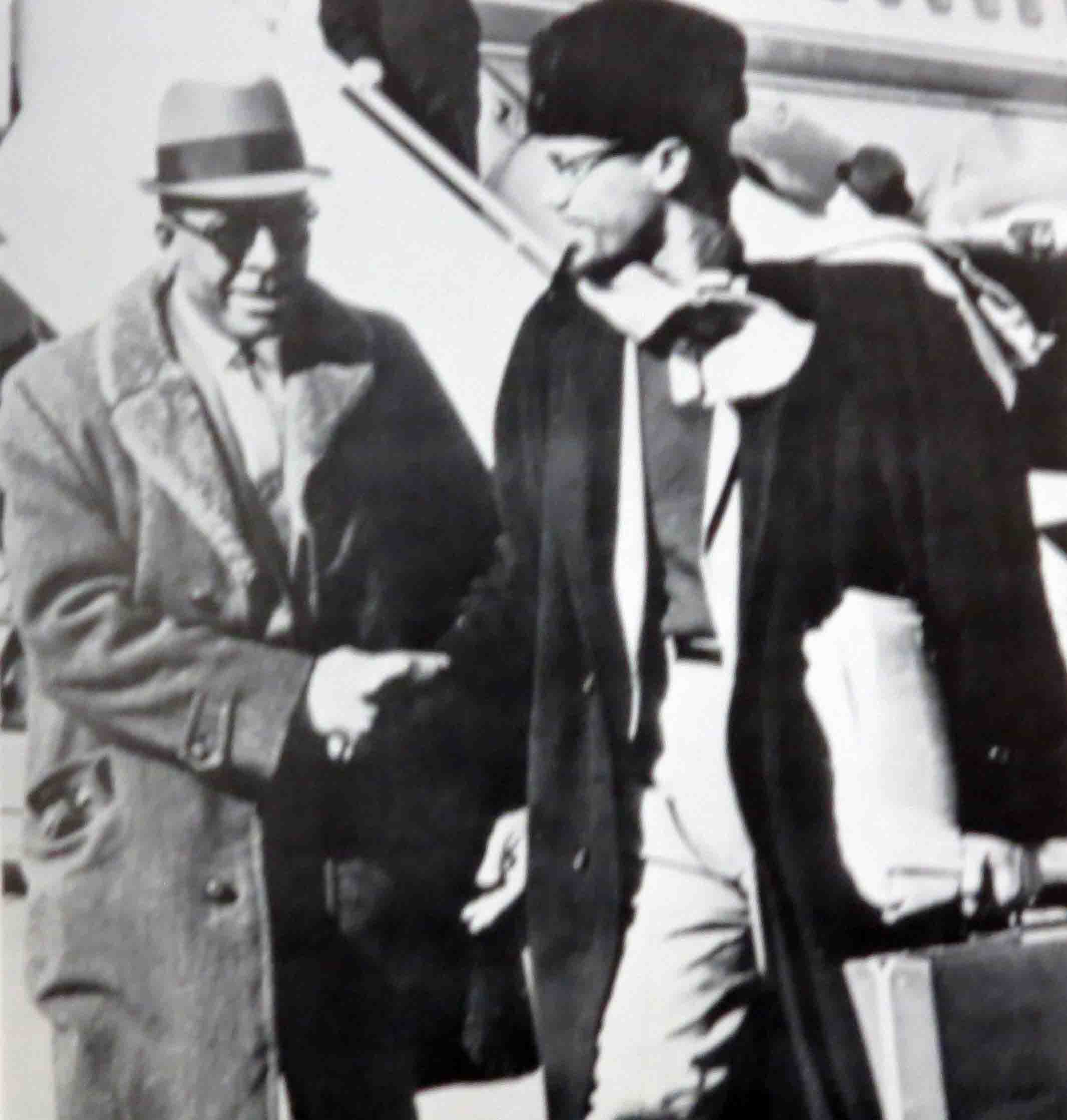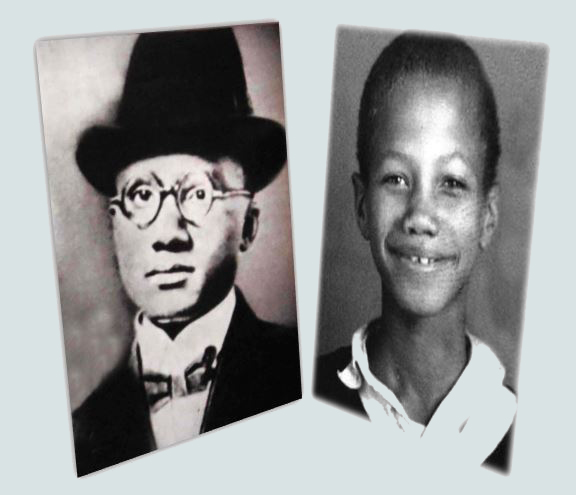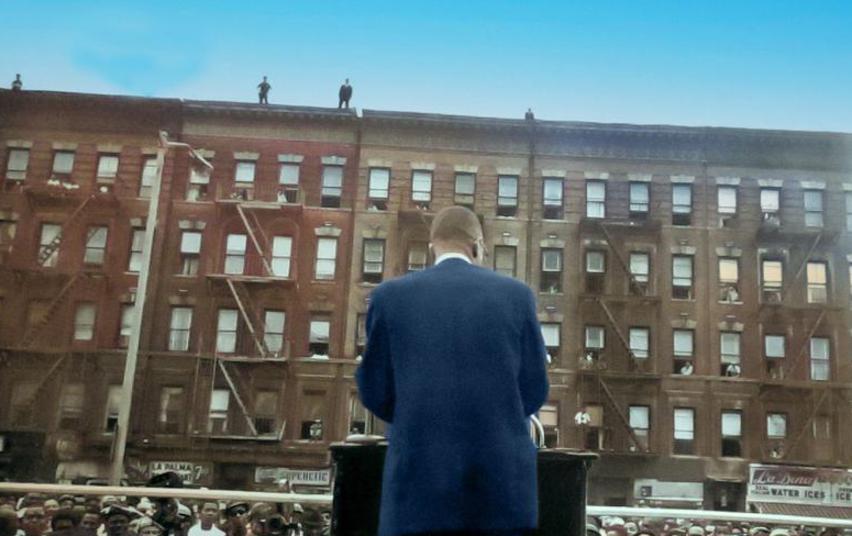In April of 1962, Mosque # 27 in Los Angeles was the scene of
a major police incident. One member of the mosque was killed and
numerous others, including police, were injured. Malcolm X was
outraged and planned demonstrations of protest against the
police departments of America.
Two thousand miles away, Detroit Police Commissioner George
Edwards, fighting his own raging battles between Detroit’s black
community and the Detroit Police Department, was relieved that
this major incident didn’t happen in his city. His relief was short lived. Malcolm X was planning a protest demonstration regarding the incident and decided to hold it at Detroit’s Olympia Stadium. To add to Edwards’s chagrin, he shortly thereafter received an invitation to the event by Malcolm X himself who had come to believe that Edwards’s efforts to reshape the Detroit Police Department were sincere. Even more shocking was the offer to sit on the speakers dais where all the NOI chieftains, including Malcolm and Elijah Muhammad would be sitting. Edwards, believing his presence on the dais would be misconstrued as being in sympathy with NOI doctrine, shrewdly elected to sit in the crowd with the common public.
Detroit Police Superintendent Louis Berg Jr., suspecting trouble, counseled Edwards to refuse in invite on the grounds that the NOI did not allow guns (including police) at their meetings and thus, if trouble arose, Berg could not adequately protect Edwards. Edwards accepted the invite. To alleviate Berg’s apprehension (and perhaps his own), a large contingent of Detroit police would be surreptitiously stationed in a nearby warehouse just in case.
The meeting proved to be uneventful. Edwards, after being briskly frisked at the door, was escorted to a seat towards the front. After stepping up to the podium, Malcolm X did indeed recognize George Edwards and thanked him for his attempts at keeping the peace. Edwards would breath a sigh of relief knowing his city dodged a potential disaster and maybe even gained a atom of respect in the process.
After Malcolm's split with the NOI:
- Alex Haley, last conversation with Malcolm, Jan, 1965
The now abandoned house of Malcolm's older brother Wilfred in Inkster, where Malcolm stayed after his release from prison in Massachusetts in 1952.
Below: Redacted FBI files from 1953 pertaining to Malcolm Little, warning the Detroit office of his presence in Inkster and of his communist and Islamic tendencies.
Malcolm X returns to the King Solomon Baptist Church for yet another legendary speech, this time regarding the failure of politicians to assist the black community in this election year of 1964. Malcolm X's famous Ballot or the Bullet speech (first given in Cleveland nine days earlier) given at the behest of Detroit Reverend Albert Cleage at the King Solomon Baptist Church in Detroit on April 12, 1964
Now free of the NOI yoke which which greatly restricted his latitude and attitude, Malcolm X warns of an upcoming revolution if the system of black oppression is not dissolved. This speech, partly fueled by the explosive situations in Birmingham the previous year, came on the cusp of East Coast riots of 1964 which greased the skids for four more years of national upheaval. The damn of upheaval had to break sooner or later and this speech put yet another mortal crack in the already crumbling damn of democracy.
(Above) After the death of Malcolm X, Dr. King sent Malcolm's wife, Betty Shabazz, this telegram expressing his condolences.
Malcolm Little, the combative fire brand whose rhetoric backed white society into a corner of simmering guilt while galvanizing the unheard voices of the down-and-out, adapted the street name of “Detroit Red” during his Harlem hustling days because of his significant ties to the State of Michigan. Having lived in Detroit, Inkster, Lansing, East Lansing, Albion and Mason, he left historic foot prints around the state and accumulated a wealth of knowledge from his experiences (mostly bad) that would greatly assist him in becoming the razor sharp militant in the years to come.
- Earl Little 1890 - 1931 Father
- Louis Helen Little 1900 - 1991 Mother
- Ella Little Collins 1914 - 1996 (Step Sister)
- Mary 1915 - ???? (Step Sister)
- Earl Little Jr. 1917 - 1941 (Step Brother)
- Wilfred Little 1920 - 1998
- Hilda Florice Little 1922 - 2015
- Philbert Little 1923 - 1993
- Malcolm Little 1925 - 1965
- Reginald Little 1927 - 2001
- Yvonne Little 1929 - 2003
- Wesley Little 1928 - ????
- Robert Little 1938 - 1999
Malcolm X
Detroit Red
1930
1937
The ominous looking facade of the Kalamazoo Mental Hospital where Louise Little would be committed in 1939 and spent the next twenty-four years of her life.
Earl Little & Son
 | ||||||
Malcolm X, with less than a week to live, exits his car outside his firebombed house in Queens after returning from Detroit. Above - Right: The same car, a black 1963 Oldsmobile 98 which was donated by Betty Shabazz, now sits at the Malcolm X College in Chicago.
1963
1958
1964
Gives famous "Ballot or the Bullet" speech
King Solomon Baptists Church - Detroit
Gives last speech in Michigan at Ford Auditorium - Detroit
Betty Sanders, who was raised in Detroit during the turbulent 1940s, had witnessed the Sojourner Truth uprising in 1942 and the following year the massive Detroit race riot of 1943. Since Detroit had baptized her in an atmosphere of unending grim belligerence, it was only natural that she gravitated towards a renegade crusader like Malcolm.
The two had known each other casually through temple business. Malcolm's spur of the moment proposal from a pay phone in a Detroit gas station caught Betty Sanders by complete surprise. The two were married at Lansing City Hall two days later with older brothers Wilfred and Philbert bearing witness to, and perhaps providing re-enforcement, to the ceremony. When the justice of the peace informed Malcolm he could now kiss the bride, he recalled later
"I got her out of there. All that Hollywood stuff. These movie and television-addicted women expecting some bouquets and kissing and hugging...like Cinderella.”
Mason football team - 1940
Gives Speech at Michigan State University
Her whole life it seemed as if Louise Little was born under a dark star which ruthlessly followed her on a trail of tears it had created, handing her tragedy at every turn.
Now minus a husband, bread winner and authoritarian presence, fate had delivered to her the ungovernable task of supporting seven children while being hopelessly trapped in a endless maze of poverty. Even though Louise collected on a $1,000 life insurance policy of Earl's, creditors formed a line down the street and around the block seeking restitution of the long standing bills Earl had left behind. Trying to distance herself from economic disaster was like trying to empty Lake Huron with a table spoon.
With nagging effrontery, the state authorities constantly appeared at the door questioning her capacity to mentor and provide for her family. Despite her iron will and Christian determination, Louise suffered a nervous breakdown and in January of 1939 was committed to the Kalamazoo State Mental Hospital. Her family was slowly parceled out to local orphanages, never to return. This is the dark side of humanity that rarely has historic light shed on it. Years later the phrase "the hate that hate produced," was aimed at Malcolm X and appropriately so. Like his mother Louise, Malcolm had a battery of reasons to hate the white world that had consumed his family.
Louise Little
1965
“He told me that he still had to make his speaking engagement in Detroit. He intended to travel wearing his charred overcoat so that when our people saw him, they might better understand the high cost of freedom. We regretfully escorted him to the airport. We would have wanted to assign a bodyguard to travel with him but we brothers had no extra funds. So Brother Malcolm flew off to Detroit, alone.”
Malcolm proved to be a good athlete and a good student, at one point being elected class president despite being in an all white school.
With the exception of his siblings, Malcolm was surrounded by a white culture throughout his youth. It wasn't until he lived in Boston's Roxury district and later Harlem that he abruptly discovered a black culture he had never known existed.
1952
 | ||||||
 | ||||||
Perhaps Earl Little sensed the guiding hand of providence in young Malcolm whom he often brought with him to witness his preaching, demonstrating to him the finer points of how to work a crowd. Perhaps Earl saw in Malcolm the next Marcus Garvey, the leader who would once and for all unite blacks. If so, his intuition would come within an ace of fulfillment.
Earl Little was no stranger to the plantation prejudice that saturated this country for a century after the Reconstruction period that was supposed to correct it. It seemed to follow him around like an ominous shadow he was unable to shake. Earl represented the vast discrepancy between the idealistic expectations of Marcus Garvey which hawked a return to Africa and the sordid reality of a society where the majority rules and the minority follows.
The tragic accidental death of Earl Little in 1931 was, contrary to popular belief, just that, an accident.
There were no witnesses to the horrific incident and thus no justification to believe otherwise except a desire to avenge a tragic situation or embellish a story.
The noticeable absence of street lights in this no-man’s-land between Lansing and East Lansing where the accident occurred lends credence to the fact that Earl Little, as he later confessed to Lawrence Baril, the police officer that found him before he died two hours later, had simply tried to board the passing trolley in the inky darkness and missed the step, falling beneath its wheels.
Temple # 1 Detroit - First ministerial assignment
Olympia Stadium
1962
1953
Sparrow Hospital in Lansing where Earl Little's agony would finally come to an merciful end.
1940
The Hollywood version of this incident, which fingers the Black Legion as having disabled Earl Little by beating him in the head with a hammer and then laid him across the tracks to meet his maker, creates great copy and adds to the legend but there is not a sliver of evidence that this ever happened.
The Black Legion was “headquartered” in Highland Park and Detroit and was not known to even have much of a presence in Lansing. The coroner ruled the death an accident. In conjunction with this there is no mention on the death certificate of damage to the head, cementing the fact that this is typical media distortion designed to spice up a story and mislead an audience regarding an already tragic tale.
Gives famous "Message to the Grass Roots" speech
King Solomon Baptists Church - Detroit
January 23
Key Excerpts - Message to the Grass Roots
"You're nothing but an ex-slave. You don't like to be told that. But what else are you? You are ex-slaves. You didn't come here on the Mayflower. You came here on a slave ship. In chains, like a horse, or a cow, or a chicken. And you were brought here by the people who came here on the
Mayflower."
"Whoever heard of a revolution where they lock arms, as Rev. Cleage was pointing out beautifully, singing, 'We Shall Overcome'?
You don't do that in a revolution. You don't do any singing; you're too busy swinging."
"You don't catch hell because you're a Methodist or a Baptist.
you don't catch hell because you're a Democrat or a Republican,
you don't catch hell because you're a Mason or an Elk,
and you sure don't catch hell because you're an American;
because if you were an American, you wouldn't catch hell.
You catch hell because you're a black man."
King Solomon Baptist Church - 14th Street, Detroit
Malcolm X being introduced at N.O.I. meeting - Olympia Stadium, Detroit June, 1962
Detroit Police Commissioner George Edwards unwillingly found himself on the hot seat.
February 14th
June 10th
June
The death of Earl Little left a suffocating vacuum in the Little family. Malcolm in particular no longer had the rudder in his life that could mold him the way Marcus Garvey had molded his father and despite the guiding influence of big sister Ella, brothers Winfred and Philbert, Malcolm would slowly gravitate into the shadowy world of the big city hustles and bottomless bogs of vice which inevitably consume miss-directed youth.
Left: Earl Little's death certificate states that his left arm and left leg were crushed but makes no mention of alleged head injuries purportedly inflicted by the Black Legion.
Right: Newspaper clipping of accident.
April 12th
Detroit’s black community in the 1960s was as fractured as Vietnam. Old School Baptists, led by the ebullient Reverend C.L. Franklin, regarded Martin Luther King as the black Jesus. Hard core militants were firmly in the corner of Reverend Albert Cleage who spoke of "A Black Nation"
Into this civil war leapt Malcolm X, who, at the behest of Reverend Cleage, ignited an awakening community to the devisive racial issues, acusing Dr. King of being a failed leader and an Uncle Tom.
Within weeks of this speech, President John Kennedy would be dead and Malcolm X would begin his rapid withdrawal and eventual banishment from the NOI, thus making this one of his last pure militant speeches and many believe his best.
Still wearing his smoke saturated clothes only hours after his home in Queens was fire bombed, Malcolm X steps off the plane in Detroit to give his final performance to the state that had figured so prominently in his upbringing. Now a marked man, he seemed only a shadow of the fiery revolutionary that once captivated legions, putting an ember of hope into the destitute and an element of fear into everyone else.
November 10th
(Right) The only meeting between the two civil rights titans occurred on March 26, 1964 after a Senate hearing on the Civil Rights Bill.
Malcolm X attempts to inculcate an overwhelmingly white, student body audience at MSU's Erickson-Kiva auditorium. This speech occurred when Malcolm was still with the NOI and thus had a more militant emphasis although he was more inclined to tone it down for younger, more influential crowds. This particular speech sought to differentiate between the plantation "House Negro" and the "Field Negro", but clearly the modern day analogy was between his separatist view of society and his arch rival, Martin Luther King, who preached peace and in Malcolm's view King was the modern day (Uncle Tom) "House Negro" who embraced his enemy instead of confronting him.
“So you have two types of Negro. The old type and the new type. Most of you know the old type. When you read about him in history during slavery he was called "Uncle Tom." He was the house Negro. And during slavery you had two Negroes. You had the house Negro and the field Negro.
The house Negro usually lived close to his master. He dressed like his master. He wore his master's second-hand clothes. He ate food that his master left on the table. And he lived in his master's house--probably in the basement or the attic--but he still lived in the master's house.”
A tired and haggard Malcolm X gives his last speech in Michigan at the Ford Auditorium. The death threats, unending travel and inability to distance himself from the arch villain reputation of yesteryear had finally caught up to him.
The Ford Auditorium speech was a rambling consortium of excuses, rhetoric and old hat bromides that was losing its mojo. It was an ignominious exit for one of the great leaders of the 1960s, who, having been painted by fate into a corner of confusion and turmoil from which he could not extricate himself, was now struggling to piece together a coherent thought.
Malcolm X was the galvanizing force for the smoldering ghetto anger which crested following his death. He harnessed the lingering ferocity of a few and gave the impression that his platoon was really a battalion. After all, it is only a small minority that storms the Bastille.
Called Temple # 1 because it was the first temple the NOI established. This is where Malcolm X first cut his teeth as an orator.The training wheels didn't come off right away but his self-confidence accelerated at the speed of a reborn man.
Appalled at the low membership of the mosque, he quickly took to the streets to unleash his well rehearsed prison diatribes at unsuspecting, and sometime attentive, Detroiters. The NOI began to flourish because of this young upstart, later to take the street name 'Detroit Red'.
Epilogue
“Brother Malcolm had a message that hung together. You could listen to him and you wouldn’t find a hole in it. You might not like his words, and you might wish that he had said it more gently, but you had to say, ‘That’s right!’
Gradually people began to understand that not only was it true, but Brother Malcolm’s message offered the only basis for salvation for black people. To identify an enemy, to understand him, to realize that he is violent and to recognize the fact that we are engaged in a power struggle – this was Brother Malcolm’s message”
“No, I’m not an American. I’m one of the 22 million black people who are the victims of Americanism. One of the 22 million black people who are the victims of democracy, nothing but disguised hypocrisy. So, I’m not standing here speaking to you as an American, or a patriot, or a flag-waver – no, not I. I’m speaking as a victim of this American system. And I see America through the eyes of the victim, I don’t see any American dream; I see an American nightmare.”
“If we don’t do something real soon, I think you’ll have to agree that we’re going to be forced either to use the ballot or the bullet. It’s one or the other in 1964. Is isn’t that time is running out – time has run out! Now we have the type of black man on the scene in America today who just doesn’t intend to turn the other cheek any longer.”
Listen to speech
Listen to speech
Listen to speech
Listen to speech
 | ||||





